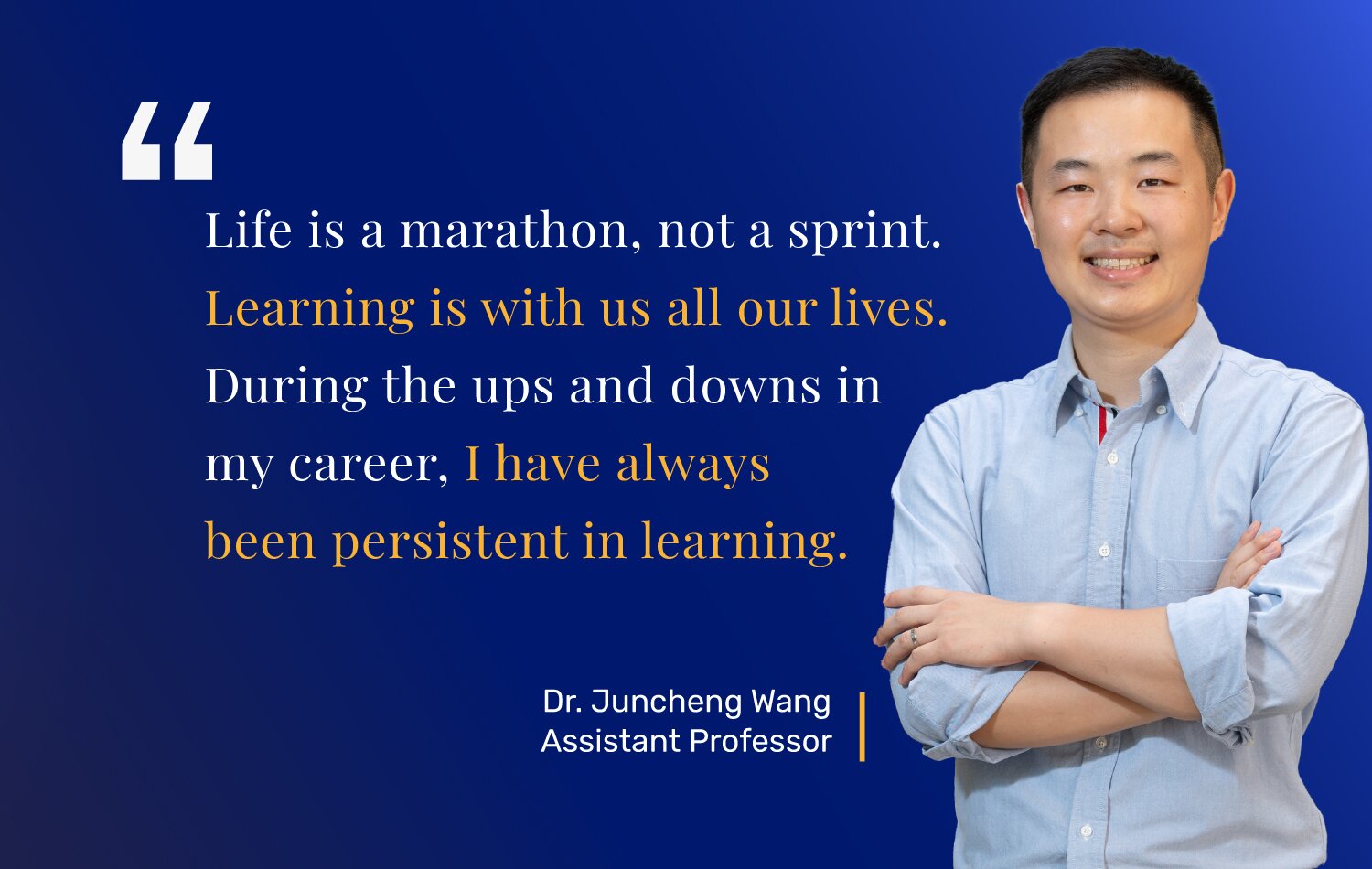
With the technological advancements made in wireless networks, artificial intelligence, and cloud computing, among other fields, data is constantly being collected from edge devices and sent over communication networks for computation at cloud servers. Dr Wang Juncheng, Assistant Professor at the Department of Computer Science, is challenging this pattern with his online learning methodology. This aims to enhance the efficiency of computation and communication for distributed machine-learning applications.
Small idea sparks interdisciplinary research
Citing our mobile phones as examples of what he means, Dr Wang explained the inspiration behind his research, “Smartphones nowadays are built with high computing capacities. They also contain sensitive or private data that are at risk of security breaches on the Internet. What if our phones can handle the computations locally and send processed data to the server?”
This question has led to an interdisciplinary project that bridges communication and computation. While the former is primarily focused on wireless transmission and signal processing, the latter is concerned with issues such as cloud computing and task offloading. In previous studies, the two areas have been largely considered separately.
Dr Wang’s innovative online learning methodology sets up scenarios in which data is optimised over time for both computation and communication, enabling the appropriate allocation of system resources for low-latency and high-accuracy machine-learning applications. With this integrated approach, when computed data is transmitted, resources are being diverted to enhance the efficiency of communication. Similarly, the quality of computation can be enriched by optimising communication performance. Given the dynamic nature of computation tasks and the communication environment, online learning is in a better position to handle resource allocation jobs in a flexible and efficient manner.
Tackling weaknesses of conventional workflow
Centralised computing like the cloud is extremely powerful, but it relies heavily on a large server to process huge amounts of readily available data. Taking our mobile phones as an example again, they generate a huge amount of data locally. Uploading all the data onto the cloud would cause a large communication overhead either using cellular or wi-fi networks, jamming the existing communication systems and causing storage issues on the cloud. Furthermore, users nowadays are increasingly aware of the need to safeguard their personal and private data against various forms of online scams and privacy attacks, and therefore are inclined to keep their data on local devices.
Dr Wang’s solution is to promote collaborative computation at the local level so that a few devices in close proximity can connect with each other and cooperate to carry out some machine-learning tasks. Only the computation outcomes or machine-learning models are transmitted to the server or cloud to facilitate further processing.
In terms of industry applications, the methodology is capable of handling general tasks and is not limited to specific scenarios. Dr Wang, however, has already developed numerous applied scenarios in the back end. “For example, our mobile phones and tablets are subscribed to Internet service providers, who typically share physical infrastructures to provide services to their subscribing users. We can build virtual resources on these shared facilities, then allocate the virtual resources to appropriate base stations for processing based on the optimisation concept,” Dr Wang said, explaining his novel concept in practice.
Inspiring young minds through teaching
Since joining HKBU in July 2023, Dr Wang has enjoyed his teaching duties. In line with the University’s strategic focus on transdisciplinary education, Dr Wang is teaching undergraduate courses in the emerging fields of ArtTech and technology that benefit social health. As most of his students come from non-computer backgrounds, his programmes are designed to let students explore and appreciate the practical applications of technology in their respective fields of expertise. “Not many of us have envisioned that neural networks can become so powerful, or that artificial intelligence can make such a great impact in different fields. I believe my students will greatly benefit from the basic knowledge in computer science,” Dr Wang shared.
Advice to students
When students are choosing their research areas, Dr Wang encourages them to pursue their own paths rather than going with the general flow. For some hot topics, by the time students have gained sufficient insights into them, the topics may no longer be hot. Therefore, it is better to find new research areas that combine the students’ strengths and interests, making it easier for them to make breakthroughs.
In summarising his research experience, he said, “Sometimes, you build up a new theory, but at the same time practical issues challenge your theory. You then need to improve your theory to break down its practical limitations, and new issues may arise again. Research is always a zig-zag process, and I hope you find joy in it.”
上一則消息
15.12.2023



